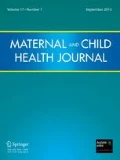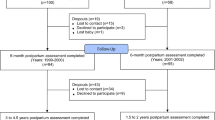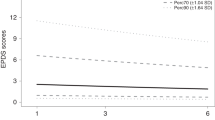Abstract
Objectives This longitudinal population study aimed to investigate if maternal depression at different time points during the perinatal period impacts children’s social-emotional development at 2 years of age. Methods Participants were women (n = 1235) who gave birth at Akershus University Hospital in Norway. Maternal depressive symptoms were assessed by using the Edinburgh Postnatal Depression Scale at pregnancy week 32 and at 8 weeks and 2 years postpartum, whereas children’s social-emotional development at the age of 2 years was assessed by using the Ages and Stages Questionnaire: Social-Emotional. Bi- and multivariate logistic regression analyses were conducted to examine the linkage between maternal perinatal depression and children’s early social-emotional development. Results Multivariate analyses showed that social-emotional problems in the child 2 years after birth were strongly associated with maternal depression at pregnancy week 32 (adjusted odds ratio (aOR) 3.4; 95 % CI 1.4–8.0), depression at 8 weeks postpartum (aOR 3.8; 95 % CI 1.7–8.6), and with depression at both time points (aOR 3.7; 95 % CI 1.5–10.1). Conclusion Findings indicate pre- and postnatal depression each bears an independent, adverse impact on children’s social-emotional development.

Similar content being viewed by others
References
Ali, N. S., Mahmud, S., Khan, A., & Ali, B. S. (2013). Impact of postpartum anxiety and depression on child’s mental development from two peri-urban communities of Karachi, Pakistan: a quasi-experimental study. BMC Psychiatry, 13, 274.
Andersson, L., Sundström-Poromaa, I., Wulff, M., Aström, M., & Bixo, M. (2006). Depression and anxiety during pregnancy and six months postpartum: A follow-up study. Acta obstetricia et gynecologica Scandinavic, 85(8), 937–944.
Bergman, K., Sarkar, P., Glover, V., & O’Connor, T. G. (2008). Quality of child-parent attachment moderates the impact of antenatal stress on child fearfulness. Journal of Child Psychology and Psychiatry and Allied Disciplines, 49(10), 1089–1098.
Bonari, L., Pinto, N., Ahn, E., Einarson, A., Steiner, M., & Koren, G. (2004). Perinatal risks of untreated depression during pregnancy. Canadian Journal of Psychiatry, 49(11), 726–735.
Briggs, R. D., Stettler, E. M., Silver, E. J., Schrag, R. D., Nayak, M., Chinitz, S., et al. (2012). Social-emotional screening for infants and toddlers in primary care. Pediatrics, 129(2), e377–e384.
Chittleborough, C. R., Lawlor, D. A., & Lynch, J. W. (2012). Prenatal prediction of poor maternal and offspring outcomes: Implications for selection into intensive parent support programs. Maternal and Child Health Journal, 16(4), 909–920.
Cohen, J. (1988). Statistical Power Analysis for the Behavioral Sciences (2nd ed.). New Jersey: Lawrence Erlbaum.
Cox, J., & Holden, J. (2003). Perinatal mental health: A guide to the Edinburgh Postnatal Depression Scale (EPDS). London: Royal College of Psychiatrists.
Cox, J. L., Holden, J. M., & Sagovsky, R. (1987). Detection of postnatal depression. Development of the 10-item Edinburgh Postnatal Depression Scale. The British Journal of Psychiatry: The Journal of Mental Science, 150, 782–786.
Dalgard, O. S., Dowrick, C., Lehtinen, V., Vazquez-Barquero, J. L., Casey, P., Wilkinson, G., et al. (2006). Negative life events, social support and gender difference in depression: A multinational community survey with data from the ODIN study. Social Psychiatry and Psychiatric Epidemiology, 41(6), 444–451.
Deave, T., Heron, J., Evans, J., & Emond, A. (2008). The impact of maternal depression in pregnancy on early child development. BJOG: An International Journal of Obstetrics and Gynaecology, 115(8), 1043–1051.
Delgado-Rodríguez M., & Llorca J.(2004). Bias. Journal of Epidemiology and Community Health, 58(8),635-641.
Eberhard-Gran, M., Eskild, A., Tambs, K., Schei, B., & Opjordsmoen, S. (2001). The Edinburgh Postnatal Depression Scale: Validation in a Norwegian community sample. Nordic Journal of Psychiatry, 55(2), 113–117.
Eberhard-Gran, M., Slinning, K., & Rognerud, M. (2014). Screening for postnatal depression–a summary of current knowledge. Tidsskrift for den Norske Legeforening, 134(3), 297–301.
Garthus-Niegel, S., von Soest, T., Knoph, C., Simonsen, T. B., Torgersen, L., & Eberhard-Gran, M. (2014). The influence of women’s preferences and actual mode of delivery on post-traumatic stress symptoms following childbirth: a population-based, longitudinal study. BMC Pregnancy and Childbirth, 14, 191.
Glover, V. (2014). Maternal depression, anxiety and stress during pregnancy and child outcome; what needs to be done. Best Practice & Research Clinical Obstetrics & Gynaecology, 28(1), 25–35.
Hay, D. F., Pawlby, S., Waters, C. S., & Sharp, D. (2008). Antepartum and postpartum exposure to maternal depression: Different effects on different adolescent outcomes. Journal of Child Psychology and Psychiatry and Allied Disciplines, 49(10), 1079–1088.
Kingston, D., Tough, S., & Whitfield, H. (2012). Prenatal and postpartum maternal psychological distress and infant development: A systematic review. Child Psychiatry and Human Development, 43(5), 683–714.
Kvalevaag, A. L., Ramchandani, P. G., Hove, O., Eberhard-Gran, M., Assmus, J., Havik, O. E., et al. (2014). Parents’ prenatal mental health and emotional, behavioral and social development in their children. Child Psychiatry and Human Development,. doi:10.1007/s10578-014-0527-6.
Monk, C., Sloan, R. P., Myers, M. M., Ellman, L., Werner, E., Jeon, J., et al. (2004). Fetal heart rate reactivity differs by women’s psychiatric status: An early marker for developmental risk? Journal of the American Academy of Child and Adolescent Psychiatry, 43(3), 283–290.
Munk-Olsen, T., Laursen, T. M., Pedersen, C. B., Mors, O., & Mortensen, P. B. (2006). New parents and mental disorders: A population-based register study. JAMA, 296(21), 2582–2589.
Murray, D., & Cox, J. L. (1990). Screening for depression during pregnancy with the edinburgh depression scale (EDDS). Journal of Reproductive and Infant Psychology, 8(2), 99–107.
Nilsen, R. M., Vollset, S. E., Gjessing, H. K., Skjaerven, R., Melve, K. K., Schreuder, P., et al. (2009). Self-selection and bias in a large prospective pregnancy cohort in Norway. Paediatric and Perinatal Epidemiology, 23(6), 597–608.
Norwegian Institute of Public Health. (2009). Medical Birth Registry of Norway. http://mfr-nesstar.uib.no/mfr/. Accessed 15 November 2015.
Nosarti, C., Reichenberg, A., Murray, R. M., Cnattingius, S., Lambe, M. P., Yin, L., et al. (2012). Preterm birth and psychiatric disorders in young adult life. Archives of General Psychiatry, 69(6), E1–E8.
O’Hara, M. W., & Swain, A. M. (1996). Rates and risk of postpartum depression—a meta-analysis. International Review of Psychiatry,. doi:10.3109/09540269609037816.
Pawlby, S., Hay, D. F., Sharp, D., Waters, C. S., & O’Keane, V. (2009). Antenatal depression predicts depression in adolescent offspring: Prospective longitudinal community-based study. Journal of Affective Disorders, 113(3), 236–243.
Pearlstein, T., Howard, M., Salisbury, A., & Zlotnick, C. (2009). Postpartum depression. American Journal of Obstetrics and Gynecology, 200(4), 357–364.
Pearson, R. M., Evans, J., Kounali, D., Lewis, G., Heron, J., Ramchandani, P. G., et al. (2013). Maternal depression during pregnancy and the postnatal period: Risks and possible mechanisms for offspring depression at age 18 years. JAMA Psychiatry, 70(12), 1312–1319.
Salomonsson, B., & Sleed, M. (2010). The Ages & Stages Questionnaire: Social–Emotional: A validation study of a mother-report questionnaire on a clinical mother–infant sample. Infant Mental Health Journal, 31(4), 412–431.
Smith, G. T., McCarthy, D. M., & Anderson, K. G. (2000). On the sins of short-form development. Psychological Assessment, 12(1), 102–111.
Squires, J. B., Bricker, D., & Twombly, E. (2002). The ASQ:SE User’s Guide for the Ages & Stages Questionnaires: Social-Emotional. A Parent-Completed, Child-Monitoring System for Social-Emotional Behaviors. Baltimore: Paul H Brookes Pub Co.
Stein, A., Pearson, R. M., Goodman, S. H., Rapa, E., Rahman, A., McCallum, M., et al. (2014). Effects of perinatal mental disorders on the fetus and child. Lancet (London, England), 384(9956), 1800–1819.
Storksen, H. T., Eberhard-Gran, M., Garthus-Niegel, S., & Eskild, A. (2012). Fear of childbirth; the relation to anxiety and depression. Acta Obstetricia et Gynecologica Scandinavica, 91(2), 237–242.
Walker, M. J., Davis, C., Al-Sahab, B., & Tamim, H. (2013). Reported maternal postpartum depression and risk of childhood psychopathology. Maternal and Child Health Journal, 17(5), 907–917.
Waters, C. S., Hay, D. F., Simmonds, J. R., & van Goozen, S. H. (2014). Antenatal depression and children’s developmental outcomes: Potential mechanisms and treatment options. European Child and Adolescent Psychiatry, 23(10), 957–971.
Weinstock, M. (2005). The potential influence of maternal stress hormones on development and mental health of the offspring. Brain, Behavior, and Immunity, 19(4), 296–308.
Funding
The Akershus Birth Cohort study was funded by the Research Council of Norway, Project Number 191098.
Author information
Authors and Affiliations
Corresponding author
Ethics declarations
Conflict of interest
The authors have no conflicts of interest to disclose.
Rights and permissions
About this article
Cite this article
Junge, C., Garthus-Niegel, S., Slinning, K. et al. The Impact of Perinatal Depression on Children’s Social-Emotional Development: A Longitudinal Study. Matern Child Health J 21, 607–615 (2017). https://doi.org/10.1007/s10995-016-2146-2
Published:
Issue Date:
DOI: https://doi.org/10.1007/s10995-016-2146-2




